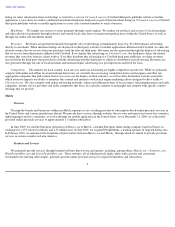ServiceMagic 2009 Annual Report Download - page 19
Download and view the complete annual report
Please find page 19 of the 2009 ServiceMagic annual report below. You can navigate through the pages in the report by either clicking on the pages listed below, or by using the keyword search tool below to find specific information within the annual report.
Table of Contents
The continued widespread adoption of new internet or telecommunications technologies and devices or other technological changes could
require us to modify or adapt our services or infrastructures and our failure to do so could render our existing websites, services and proprietary
technologies obsolete, which could adversely affect our business, financial condition and results of operations. For example, user and usage
volumes on mobile devices continue to increase relative to those of personal computers. The lower resolution, functionality and memory
associated with mobile devices could make the use of our various services through these devices difficult. While we have developed mobile
versions of certain of our services, we have limited experience with these applications and they may not be compelling to users. Furthermore,
existing agreements across our business may need to be amended to cover the provision of our services on mobile devices, which the
counterparties may be unwilling to do.
Furthermore, in the case of our search services, third parties have introduced (and continue to introduce) new technologies and applications
that may interfere with the ability of our users to access or utilize some of our services generally. For example, third parties have introduced
technologies and applications that prevent users from downloading toolbars generally and/or have features that significantly lessen the likelihood
that previously downloaded toolbars will remain in active use, such as features that interfere with the functionality of search boxes embedded
within our toolbars and the maintenance of settings previously selected by consumers in connection with the downloading of our toolbars. Third
parties have also introduced technologies and applications that are either not compatible with (or otherwise interfere with) the "search assistant"
function embedded within our toolbars, pursuant to which our toolbars generate search results for users that receive "DNS," "404" and other
errors in response to search queries entered into search boxes embedded with our toolbars or the address bar of their web browsers. These
technologies and applications adversely impact our ability to generate search queries through our toolbars, which in turns adversely impacts our
revenues. Our failure to successfully modify our toolbars in a cost-effective manner in response to the introduction and adoption of these new
technologies and applications could adversely affect our business, financial condition and results of operations.
We may experience operational and financial risks in connection with acquisitions. In addition, some of the businesses we acquire may incur
significant losses from operations or experience impairment of carrying value.
We have made numerous acquisitions in the past and our future growth may depend, in part, on acquisitions. We may experience
operational and financial risks in connection with acquisitions. To the extent that we continue to grow through acquisitions, we will need to:
• successfully integrate the operations, as well as the accounting, financial controls, management information, technology, human
resources and other administrative systems, of acquired businesses with our existing operations and systems;
•
retain or hire senior management and other key personnel at acquired businesses; and
• successfully manage acquisition-related strain on the management, operations and financial resources of IAC and/or acquired
businesses.
We may not be successful in addressing these challenges or any other problems encountered in connection with historical and future
acquisitions. In addition, the anticipated benefits of one or more acquisitions may not be realized and future acquisitions could result in
potentially dilutive issuances of equity securities and the assumption of contingent liabilities. Also, the value of goodwill and other intangible
assets acquired could be impacted by one or more continuing unfavorable events and/or trends, which could result in significant impairment
charges. The occurrence of any these events could have an adverse effect on our business, financial condition and results of operations.
15
























